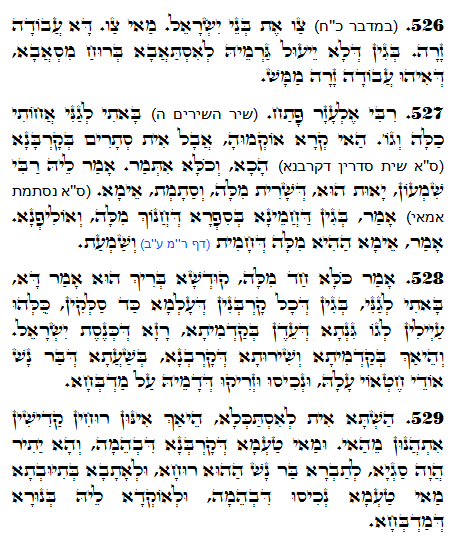Daily Zohar # 1257 – Pinchas – “I come into my garden”
Daily Zohar 1257
Daily Zohar 1257
Zohar Pinchas, Vol. 20 (English)/Vol 15 (Hebrew)
Hebrew translation:
526. צַו אֶת בְּנֵי יִשְׂרָאֵל (במדבר כח). מַהוּ צַו? זֶה עֲבוֹדָה זָרָה, כְּדֵי שֶׁלֹּא יַכְנִיס עַצְמוֹ לְהִטַּמֵּא בְּרוּחַ טֻמְאָה, שֶׁהִיא עֲבוֹדָה זָרָה מַמָּשׁ.
527. רַבִּי אֶלְעָזָר פָּתַח, (שיר השירים ה) בָּאתִי לְגַנִּי אֲחֹתִי כַלָּה וְגוֹ’. פָּסוּק זֶה בֵּאֲרוּהוּ, אֲבָל יֵשׁ דְּבָרִים נִסְתָּרִים בַּקָּרְבָּן (שִׁשָּׁה סְדָרִים בַּקָּרְבָּן) כָּאן, וְהַכֹּל נִתְבָּאֵר. אָמַר לוֹ רַבִּי שִׁמְעוֹן, יָפֶה הוּא שֶׁהִתְחַלְתָּ הַדָּבָר, וְסָתַמְתָּ, תֹּאמַר. (סָתַמְתָּ מַדּוּעַ?) אָמַר, מִשּׁוּם שֶׁרָאִיתִי בְּסִפְרוֹ שֶׁל חֲנוֹךְ דָּבָר וְלָמַדְתִּי. אָמַר, תֹּאמַר אוֹתוֹ הַדָּבָר שֶׁרָאִיתָ וְשָׁמַעְתָּ.
528. אָמַר, הַכֹּל דָּבָר אֶחָד, הַקָּדוֹשׁ בָּרוּךְ הוּא אָמַר אֶת זֶה, בָּאתִי לְגַנִּי, בִּגְלַל שֶׁכָּל קָרְבְּנוֹת הָעוֹלָם כַּאֲשֶׁר עוֹלִים, כֻּלָּם עוֹלִים לְתוֹךְ גַּן עֵדֶן בַּתְּחִלָּה, סוֹד כְּנֶסֶת יִשְׂרָאֵל. וְכֵיצַד? בָּרִאשׁוֹנָה וּבְהַתְחָלַת הַקָּרְבָּן, בְּשָׁעָה שֶׁאָדָם מוֹדֶה עַל חֲטָאָיו, וּשְׁחִיטָתוֹ וּזְרִיקַת דָּמוֹ עַל הַמִּזְבֵּחַ.
529. עַתָּה יֵשׁ לְהִסְתַּכֵּל, אֵיךְ אוֹתָן רוּחוֹת קְדוֹשׁוֹת נֶהֱנוֹת מִזֶּה, וּמַה טַּעַם שֶׁל קָרְבַּן בְּהֵמָה, וַהֲרֵי יוֹתֵר הָיָה רָאוּי לָאָדָם לִשְׁבֹּר אוֹתָהּ הָרוּחַ וְלָשׁוּב בִּתְשׁוּבָה, וּמָה הַטַּעַם שֶׁל שְׁחִיטַת הַבְּהֵמָה וּלְשָׂרְפָהּ בְּאֵשׁ הַמִּזְבֵּחַ?
Pinchas 526-529
Numbers 28:2
“צַו אֶת-בְּנֵי יִשְׂרָאֵל, וְאָמַרְתָּ אֲלֵהֶם: אֶת-קָרְבָּנִי לַחְמִי לְאִשַּׁי, רֵיחַ נִיחֹחִי, תִּשְׁמְרוּ, לְהַקְרִיב לִי בְּמוֹעֲדוֹ”
“Command the children of Israel, and say unto them: The sacrifices, which are presented unto Me for offerings for the fire, of a sweet savor unto Me, shall ye observe to offer unto Me in its due season.”
The Zohar says the ‘command’ is idol worshiping and the sacrifices were brought to the Altar to protect us from the impure spirit.
Song of Songs 5:1
“בָּאתִי לְגַנִּי, אֲחֹתִי כַלָּה–אָרִיתִי מוֹרִי עִם-בְּשָׂמִי,”
“I am come into my garden, my sister, my bride; I have gathered my myrrh with my spice;”
Rabbi Elazar explains that after a person confesses his impurities, the animal is slaughtered and its blood is splashed on the altar. The sacrifices ascend and they first enter into the Garden of Eden because they awaken the unification of the Light and the vessel.
The Zohar asks the question why the sacrifices are animals. Isn’t it enough that the person breaks the impurities in his heart and repents? What is the point in slaughtering the animals and burning them on the Altar?
Rabbi Elazar gives the answers in the next DZ
{||}

 Previous: Pinchas
Previous: Pinchas

